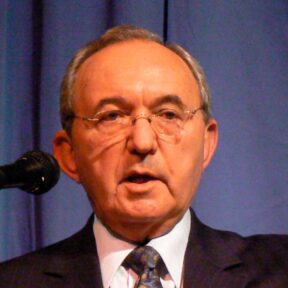
Richard Goldstone
Photo from Wikimedia Commons / Author of Photo: Sifiboy31 at English WikipediaOverview
* Prominent liberal internationalist
* Headed the U.N.-commissioned Goldstone Report, which found Israel guilty of war crimes
Richard Goldstone was born in 1938 and raised in South Africa. In 1962, he graduated from the University of the Witwatersrand with a BA LLB cum laude and practiced as an advocate at the Johannesburg Bar. In 1976 Goldstone was appointed senior counsel and, in 1980 became Judge of the Transvaal Supreme Court. In 1989 he was appointed Judge of the Appellate Division of the Supreme Court and eventually became a Justice of the Constitutional Court of South Africa from 1994 to 2003.
Goldstone’s legal career in South Africa was particularly elevated by his appointment to the Commission of Inquiry Regarding the Prevention of Public Violence and Intimidation, informally known as the Goldstone Commission, which, from 1991 to 1994, investigated the inhumane behavior of white security forces during the apartheid era. During the final years of apartheid, however, Goldstone had upheld repressive laws and did not challenge the system, although he served in a judicial position which gave him the power to do so. His critics charge that only when it became clear that the system was crumbling did Goldstone become a public foe of apartheid.
Immediately following Goldstone’s work with this commission, the United Nations appointed him the Chief Prosecutor of the UN International Criminal Tribunals for the former Yugoslavia and Rwanda. From 1999 to 2001, he chaired the International Independent Inquiry on Kosovo. Among the many honorary doctorates and international awards bestowed upon Goldstone are the International Human Rights Award of the American Bar Association (1994), the Richard E. Neustadt Award from the Kennedy School of Government at Harvard University (2007), and the McArthur Foundation Award for International Justice (2008). Since 2004, he has taught as a visiting professor at Harvard Law School, NYU Law School, Fordham Law School, and Georgetown Law School.
After Israel’s Operation Cast Lead], a three-week mission into Gaza, in January of 2009, the United Nations commissioned Goldstone to head an investigation into war crimes. The commission was political from the onset: The Organization of the Islamic Conference, a body hostile to Israel, had initiated the fact-finding mission to Gaza and the resulting UN resolution founding the investigative commission as a blow against Israel. Despite the obvious bias of the resolution, Goldstone accepted and quickly attempted to give his commission a façade of fairness. He persuaded the president of the UN Human Rights Council to give an oral statement that the fact-finding mission was also authorized to investigate Hamas, but this declaration was never incorporated into a resolution and had no legal force.
In September 2009, Goldstone, who at the time was a board member of Human Rights Watch, submitted a 575-page “Report of the United Nations Fact Finding Mission on the Gaza Conflict” to the UN and, in October, the UN officially endorsed his findings. While Goldstone and his commission faulted Hamas for the rocket attacks against Israel that had precipitated the war, they devoted the bulk of the report to castigating Israel, charging that its attacks — some of which “purposely targeted civilians in Gaza” — amounted to “reprisals,” “collective punishment,” “war crimes,” and “possibly crimes against humanity.” Israeli President Shimon Peres quickly termed the report a “mockery” and questioned the moral equivalency between attacks waged by a “terrorist organization” and the legitimate right of a state to defend itself from aggression.
Critics of the Goldstone Report contended that the investigation was biased from its inception and violated international standards for inquiries by favoring anti-Israel witnesses and downplaying Hamas’ war crimes and its use of the Palestinian people to shield it from reprisal. On March 22, 2010, David Littman, NGO representative to the United Nations, charged the Goldstone Report with a “complete omission” of any mention of the terrorist ideology of Hamas. “The Hamas Charter,” Littman emphasized, “simply calls for Jews to be killed and Israel to be eliminated,” and there is no mention of this in the report.
After its release, the Goldstone report quickly became a propaganda boon for the anti-Israel Left, Islamist groups, and radical activists for Palestine, many of whom used Goldstone’s legal and international reputation to legitimize their own virulent criticism of Israel. Norman Finkelstein, a notorious anti-Israel academic, particularly emphasized that a “significant international figure, legal figure,” authored a report “consistent with the findings of the other human rights organizations” that Israel “massacred” innocent civilians.
On April 1, 2011, Goldstone unexpectedly published a Washington Post op-ed piece recanting his own Goldstone Report and admitting that the charges it made against Israel were wrong, false, and based on insufficient or flawed information.